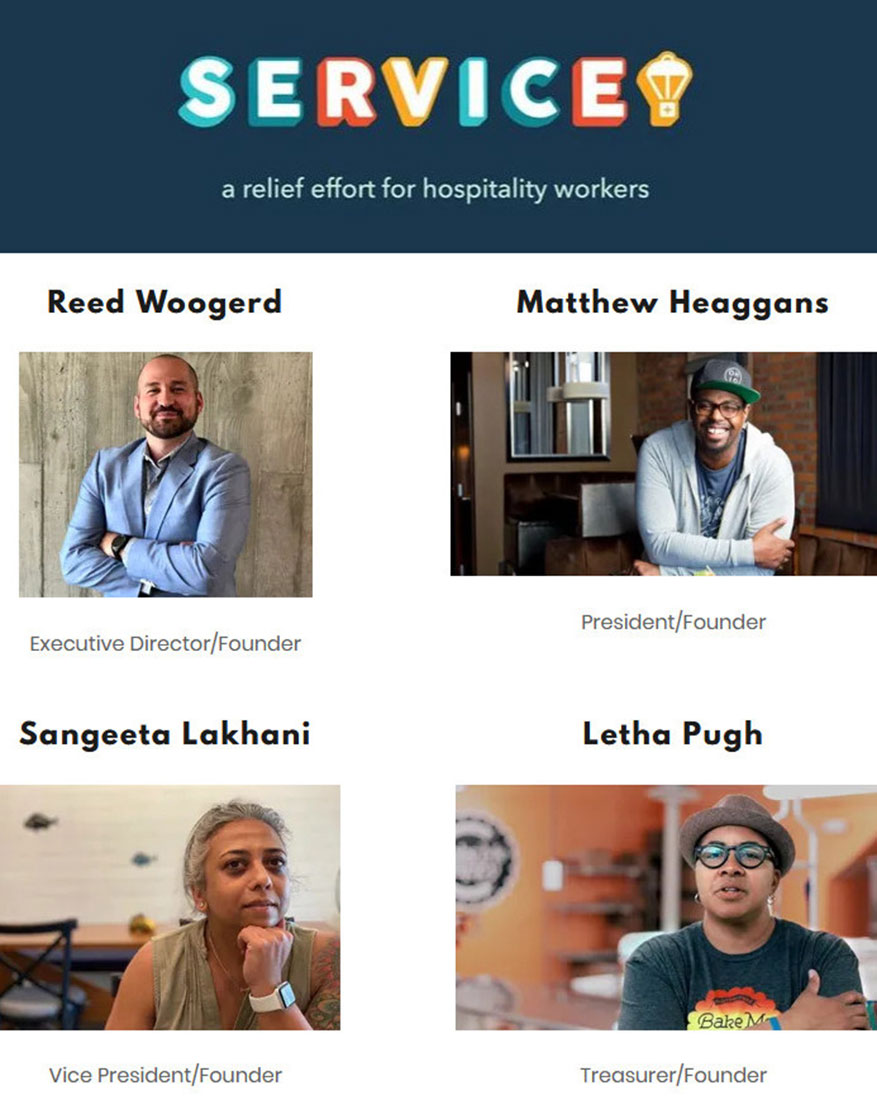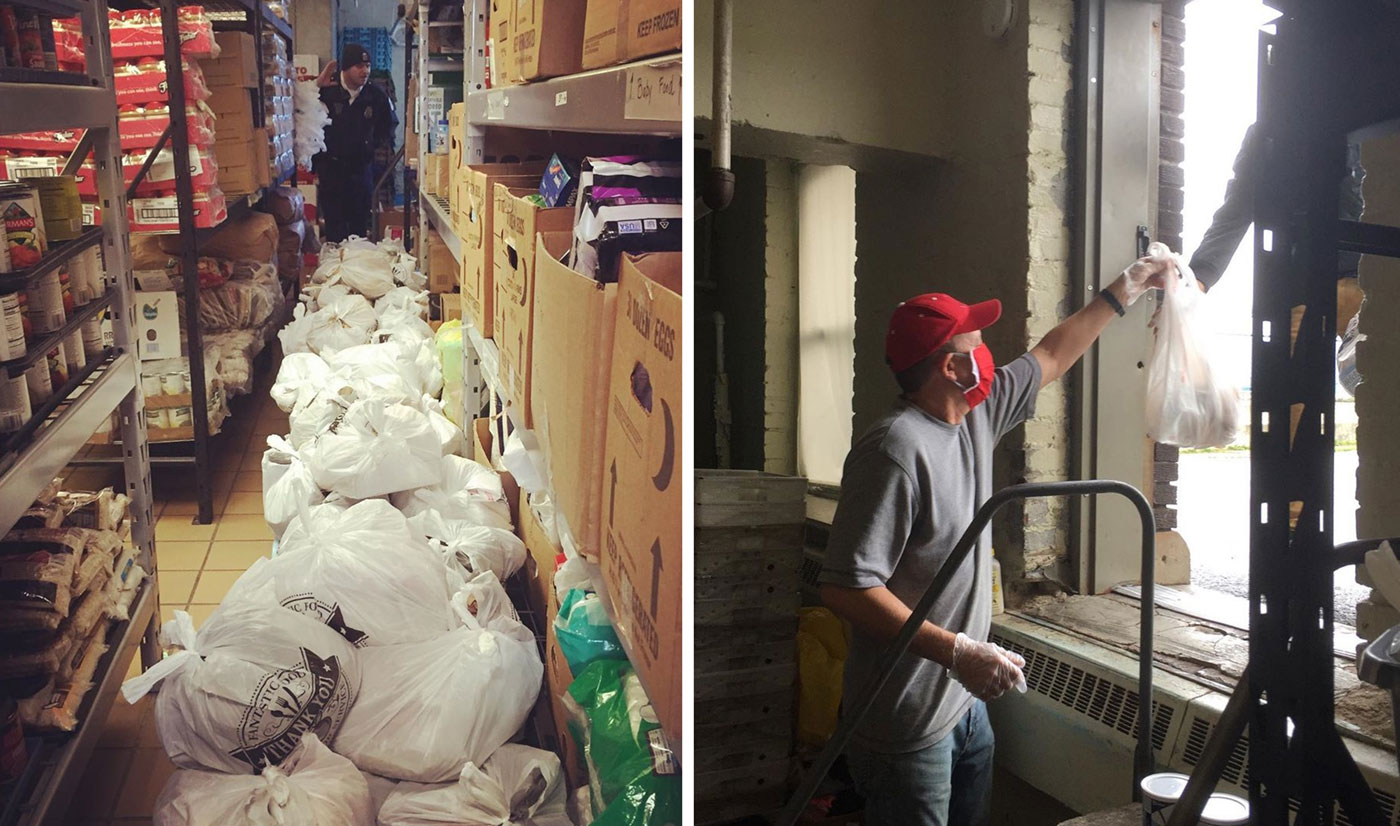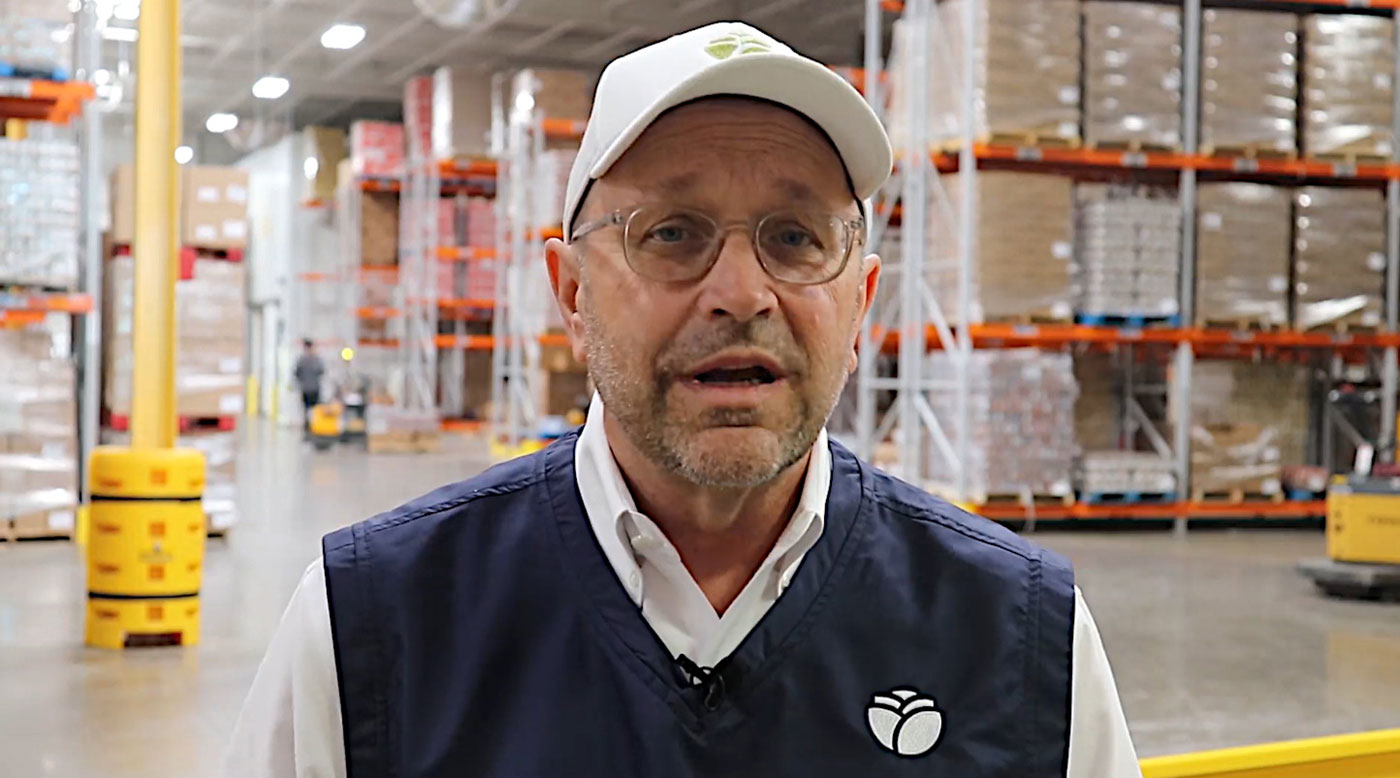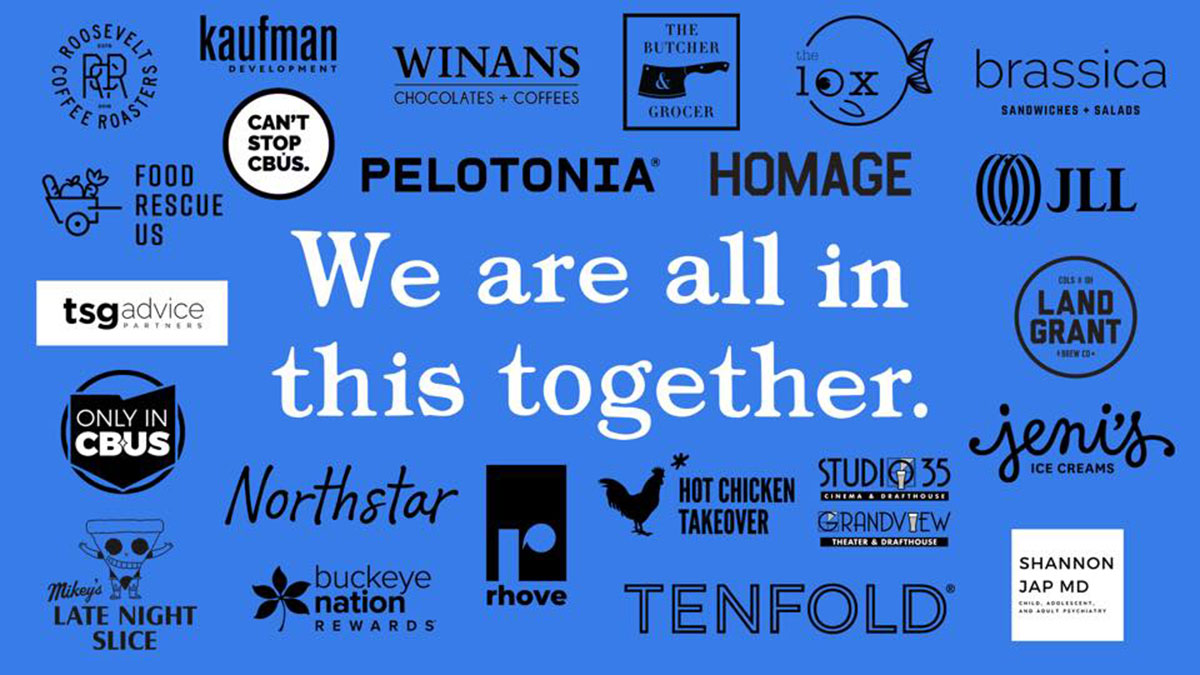Creative Approaches Help Columbus Care For Those At Risk
When Ohio’s response to COVID-19 shut down large parts of the economy, there already were many long-term poor and disadvantaged people relying on social safety net programs for their food. Suddenly they were joined in line by a new group: those unable to make ends meet because they had just lost jobs or seen their hours cut. Food banks, pantries and meal programs were stretched to their limits.
The Columbus community reacted quickly, applying some creative thinking to the challenge of supporting vulnerable populations. New nonprofit programs launched to provide solutions to the specific problems of the day. Long-established agencies made changes on the fly to adapt to a new reality. More donors, large and small, stepped forward to support these efforts.
Here are stories of how we are caring for those at greatest risk in our community.

A T-shirt from Homage was among the fund-raising items. Photo courtesy of Homage
WE ARE ALL IN THIS TOGETHER: BRANDS COMBINE FORCES
It all began, Joe DeLoss said, with phone calls among “a bunch of scrappy entrepreneurial people who really care about Columbus.” Within days, the effort had a name—We Are All In This Together—as well as a T-shirt and an Indiegogo fundraising page, all with the goal of serving the new needs of a community battling a pandemic.
DeLoss, founder of Hot Chicken Takeover, said the campaign’s mission was twofold: Get restaurant kitchens back to work, and use those meals to feed people in need. Meals would be targeted to three primary groups: displaced hospitality workers, front-line medical staff and families without access to reliable nutrition.
Offering various incentives to donors, the campaign launched on March 26 and raised $155,000 in seven days. DeLoss believes the quick success came because of the involvement of “a lot of beloved brands” recognized for their community work in Columbus. DeLoss is widely known for giving second-chance employment to people with prison records or those in recovery from addiction problems. He was joined in the campaign video by four other Columbus notables: Jeni Britton Bauer of Jeni’s Splendid Ice Creams, Ryan Vesler of Homage, Kenny Sipes of Roosevelt Coffee House and Doug Ulman of Pelotonia.
Along the way, other local sponsors joined the effort and NBC4 held a telethon, which ended up raising an addition $40,000. The Mid-Ohio Food Bank and other community resources helped the campaign work through the details of executing the plan.
Since then, the funds have been distributed to about 15 restaurants and caterers at the rate of $6 per meal, just to cover basic food costs. “Restaurants are still being very generous by participating, but it does present an opportunity to justify bringing some people back to work,” DeLoss said.
The WAAITT campaign generated its first meals in mid-April, distributed through a network of 20 agencies and organizations serving the targeted populations. DeLoss expects the campaign will end up providing close to 30,000 meals total by the time it concludes.
Beyond the meals, this campaign has brought together a network of restaurants, vendors and community resources that had not worked together before. “A legacy of this campaign should really be to maintain this infrastructure and network in times of other needs that are going to arise,” DeLoss said.
Visit cbustogether.com to see the video that launched the campaign.

The founders of the Service! relief effort, as shown on its website.
SERVICE!: RELIEF PROJECT FEEDS RESTAURANT WORKERS
Local chefs and restaurant owners launched another nonprofit effort in April to fill a specific need in the safety net. Service! is providing daily meals to newly unemployed restaurant workers and their families.
It started when Sangeeta Lakhani, owner of The Table, teamed up with Muse Hospitality’s Reed Woogerd, as well as Matthew Heaggans and Catie Randazzo of Ambrose & Eve and Letha Pugh of Bake Me Happy. With restaurants shut down, they decided to do what they know: feed people, specifically families in need.
With funding from United Way, CoverMyMeds software company and others, the group set out to hire some restaurant workers for the project and set up shop in the commercial kitchen at ECDI’s Food Fort. Using an online meal-ordering system and distributing meals from various restaurant locations, the group began serving up to 400 people daily.
They continue to raise money online, knowing that the reopening of restaurants will be a slow process and the need will continue.
“We’ll cook until we have nothing else to cook,” Pugh told Columbus City Council member Elizabeth Brown on a Facebook Live interview. “Everyone has been so generous with their time and their energy and efforts. We do feel like it is one Columbus and everyone’s working together.”
Service! continues to accept donations at servicerelief.org.

Social media photos posted by Holy Family Soup Kitchen show the “woods bags” being handed out to those in need. Photo courtesy of Holy Family.
HOLY FAMILY SOUP KITCHEN: BACK TO BASICS
The large basement dining room is dark and quiet now, with chairs upended on the long rows of tables. For more than 40 years this room had hosted a loud, even chaotic, scene as 300 or so homeless and disadvantaged people moved through every day to get a hot meal. They could expect the volunteers to dish out some words of support along with the food.
With large gatherings banned during the threat of COVID-19, the Holy Family Soup Kitchen had to shut down that dining room—and the chapel services, mobile medical care and other services offered in the old brick building that once was a school run by Holy Family Catholic Church in the Franklinton neighborhood on the West Side of Columbus.
But the core mission of serving “daily bread” goes on in a different form.
On a typical weekday now, the staff will hand out 250 to 300 bags of food to the people who line up outside the soup kitchen building, waiting for it to open at 9:30am. Each bag has enough food to cover three meals, usually including sandwiches, fruit, chips or other snacks, granola bars and bottled water. By tradition, they are called “woods bags” because they began as a way to feed people in homeless camps in the wooded areas nearby. Today they go to anyone who is hungry. In April, staff and volunteers handed out 6,670 bags, for a total of more than 20,000 meals.
“You don’t have to be homeless to get the woods bag,” said Director Dana Krull. “If somebody walks up and says they’ve got five people in their family, we hand them five woods bags. We take them at their word.”
The demand has been growing, and the food supply has been holding steady. Some comes from the Mid-Ohio Food Bank. Loyal donors have continued to give food and money. Krull has been giving updates on Facebook Live, letting people know when the pantry is running short. When he mentioned the need for bottled water, people brought it by the caseload.
“I think is the most pressing question for us right now is how are we going to sustain this?” Krull said. The question applies to the food, but also to the people assembling it. Like many charities, Holy Family has always relied on a large network of volunteers. But they are mostly retirees and therefore among the most vulnerable to this coronavirus. Krull has asked them to remain at home, relying instead on his small staff and about a dozen younger volunteers to keep the current operation going. He expects the dining room to remain closed until August. “We’ll just take it one day at a time and then see what happens.”
In a pandemic, it helps to have faith—and for Holy Family, faith is the foundation of the mission.
“You know, as Christians we trust the Lord that He’s going to do something with all of this, that He’s going to work it out for His glory,” Krull said. “At the end of the day, we’re just along for the ride.”
To learn more about the soup kitchen or to donate, visit hfsk.org.

Matt Habash, CEO of Mid-Ohio Food Collective, updates supporters in a Facebook video.
MID-OHIO FOOD COLLECTIVE: RECORD DEMAND
Central Ohio’s longtime food bank was trying to keep up with a record demand, providing 151,000 meals each day to hungry residents—and that was before the pandemic. Beginning in March, things got worse.
“There has been a drastic growth in demand,” Matt Habash wrote to donors in April. He has seen hard time before, both as president and CEO of the food bank since 1984, and as a member of Columbus City Council for 14 years.
“From mid-March to mid-April our onsite Kroger Community Pantry had a 144% increase in visits versus the same period last year,” Habash wrote. More than 40% of those people, he noted, were visiting a food pantry for the first time due to loss of jobs and income.
The food bank, now known as the Mid-Ohio Food Collective, distributed 67 million pounds of food last year through 680 partner organizations in Central and Eastern Ohio—food pantries, soup kitchens, shelters, after-school programs and senior housing sites.
It also runs a food pantry at its Grove City headquarters, set up like a store to let visitors to pick out the foods they want. For safety, that had to change to a no-touch, drive-through model. People could stay in their cars and have a pre-packaged box of food brought out to them, most likely by one of the 100 Ohio National Guard soldiers who were deployed to help the food bank with distribution.
Mid-Ohio has been able to keep up with the increased demand, aided by an emergency campaign that raised $1.2 million in two weeks from corporate and individual donors. By using its wide distribution network, the food bank also has avoided the kind of long lines seen on the news from other states.
For years, Habash has been making the point that 40% of American workers earn $12 an hour or less. The financial challenges they already faced are worse now, and it will take time to recover.
“This is a marathon, not a sprint,” he said.
Visit midohiofoodbank.org to read more or to donate.





